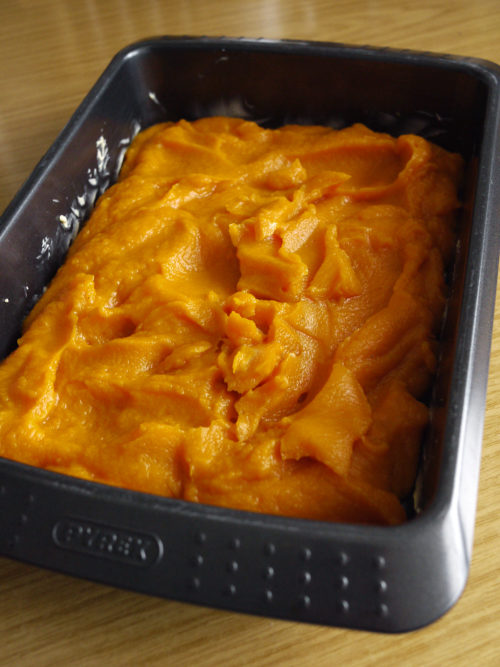
(Photo by Alexas_Fotos at Pixabay under CC0.)
As the temperatures cool and leaves begin to change color, you’ve re-discovered pumpkin.
Pumpkin is a nutritional powerhouse for people and a staple for many in the fall diet. Is it something that would benefit your dog too?
In this article, we’ll look at the meat of the pumpkin. I will post about pumpkin seeds separately.
Nutritional Information.
According to Self.com, a one cup serving of cooked canned pumpkin contains:
- 49 calories
- 8 g of protein.
- 7 g of fiber.
Large amounts of:
- Vitamin A.
- Beta carotene (powerful antioxidant which ultimately converts to even more vitamin A).
- Vitamin C.
- Potassium.
Generous amounts of:
- Vitamin K (important in healthy blood clotting)
- Vitamin E.
- Magnesium.
- Iron.
- Zinc.
Benefits of Pumpkin for Your Dog.
Calming GI Upsets:
Because it contains such a large amount of fiber, you would think pumpkin could help to keep your dog regular, and it does. Interestingly, it also helps your dog with diarrhea.
As Dr. Mercola explains here, the fiber in pumpkin is largely soluble. When mixed with water, it forms a gel-like substance that coats and soothes the GI tract. This then bulks up and slows down liquid diarrheal stools, calming the episodes of diarrhea. On the other hand, it lubricates the colon and also adds moisture to the hard constipated stools, making them easier to pass.
Although this is a great tool for minor GI upsets, diarrhea or constipation are cause for a visit to the veterinarian if they continue for more than a day or two or if your dog looks uncomfortable or ill.
Aid in Weight Loss:
Many of our four-legged family members are overweight or obese and need to lose a few (or many) pounds. Pumpkin is very low in calories, and the high fiber and water content helps your portly pooch to feel full when pumpkin is substituted for part of their regular food. Also, the nature of the soluble fiber slows down stomach emptying, making your dog feel full for longer.
Morris Animal Inn recommends substituting 1 tablespoon of pumpkin for ¼ cup of their regular food. However, you should always consult your veterinarian before making significant changes to your dog’s diet.
Other Benefits:
Oils in pumpkin meat as well as the seeds support the urinary health of your dog and can help to prevent or dislodge kidney and bladder stones.
Potassium is essential for muscle contraction and helps in recovery from physical activity.
Vitamin A supports vision, skin and muscle health.
Vitamin C is a powerful antioxidant and aids in immune support.
Vitamin K is important in healthy blood clotting.
Zinc improves skin and coat.
How Do You Feed Pumpkin to Your Dog?

(Photo by MaxStraeten at Morguefile under CC.)
There are conflicting reports as to whether or not raw pumpkin should be fed, so I’m going to ignore that option here.
When feeding pumpkin to your dog, you should use canned organic pumpkin without salt and without sugar. Be sure to buy the pumpkin meat itself rather than pumpkin pie mix, which would have added sugars and spices. If you choose to cook or can your own pumpkin, buy a cooking pumpkin rather than one for carving – again preferably organic. Don’t use the one you bought for Halloween.
Pumpkin should be added to your dog’s diet slowly, gradually working up to 1 tablespoon per day for small dogs and 2 tablespoons for large dogs, mixed in with their regular food.
If the stools become orange in color (from the beta carotene), large, and of pudding consistency, you are giving them too much. Cut back on the amount of pumpkin being fed.
Since a single can of pumpkin should contain many servings for your pet, Valerie Trumps at Pet360.com recommends to freeze 1 tablespoon servings in an ice cube tray and then pop them out to thaw as needed. What a good way to keep some on hand and avoid waste!
Cautions.
Don’t feed pumpkin if your dog has diabetes or kidney disease. Pumpkin is high in potassium and excess potassium is excreted by the kidneys.
Always consult with your veterinarian before initiating any diet change, especially if your dog has any known chronic health conditions.
Pumpkin meat contains substantial vitamin A and beta carotene, a powerful antioxidant which is converted in the body to further vitamin A. Vitamin A is a fat soluble vitamin, which means that it does not pass through the body if not needed immediately. Excess gets stored in body fat and in the liver, so it is possible to get too much of a good thing. Too much vitamin A could be toxic. Again, if stools turn orange, cut back or stop the pumpkin for a while to be safe.
Final Thoughts.
My dogs love the taste of pumpkin! It is always the first thing I use for minor stomach upsets and I keep it handy year-round. I buy the small (15 ounce) size cans and feed it daily until it’s gone (I have three dogs) but intend to start freezing it in serving sizes as suggested above. I don’t feed it consistently long-term but alternate it with other “treats” in their food, so I really can’t comment first-hand on any benefits other than for stomach upsets and their sheer enjoyment of eating it.
Lisa Spector included a recipe for “Pumpkin Squeaks” dog treats in her article, which sounds like something my guys would also enjoy. I like the fact that it uses rice flour (no gluten) and that it includes peanut butter. It’s definitely on my list for the next time I get the urge to bake.
I would love to hear your experience with pumpkin. Do you give your dog pumpkin? Do you give it sporadically or consistently? What benefits have you noticed from it?
A special “thank you” to the above-mentioned photographers for making their work available for use.
My sources for this article are listed below for further reading.
Sources/Additional Reading:
nutritiondata.self.com/facts/vegetables-and-vegetable-products/2601/2
www.livestrong.com/article/111700-canned-pumpkin-nutrition/
healthypets.mercola.com/sites/healthypets/archive/2014/09/01/pumpkin-dietary-fiber.aspx
https://www.morrisanimalinn.com/news/13-benefits-pumpkin-pets/
https://justsimplydogs.com/2016/10/keep-your-dog-safe-this-halloween/
https://www.pet360.com/dog/nutrition/is-pumpkin-good-for-my -pet/Ob7HOgPkQk-585vwSVndSg/
http://throughadogsear.com/surprising-health-benefits-of-pumpkin-for-dogs-and-cats/
https://www.dogids.com/blog/pumpkin-for-dogs/
www.peteducation.com/article.cfm?c+2+1659&aid=710
Like this? Share it!

